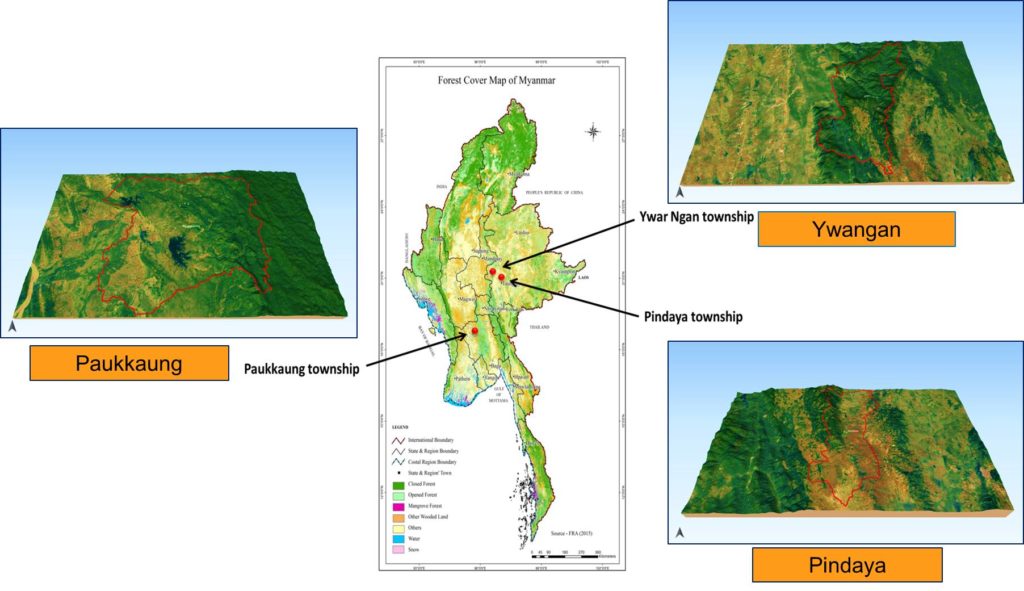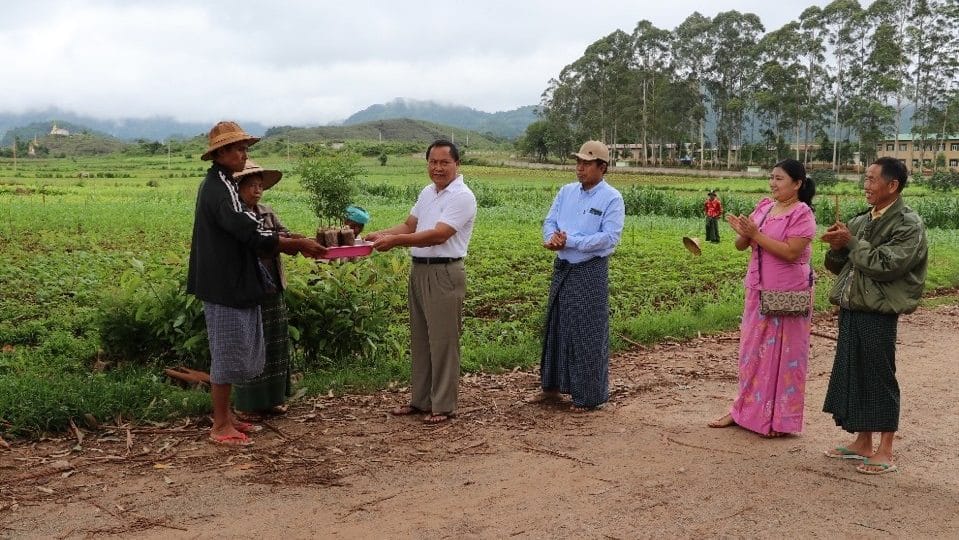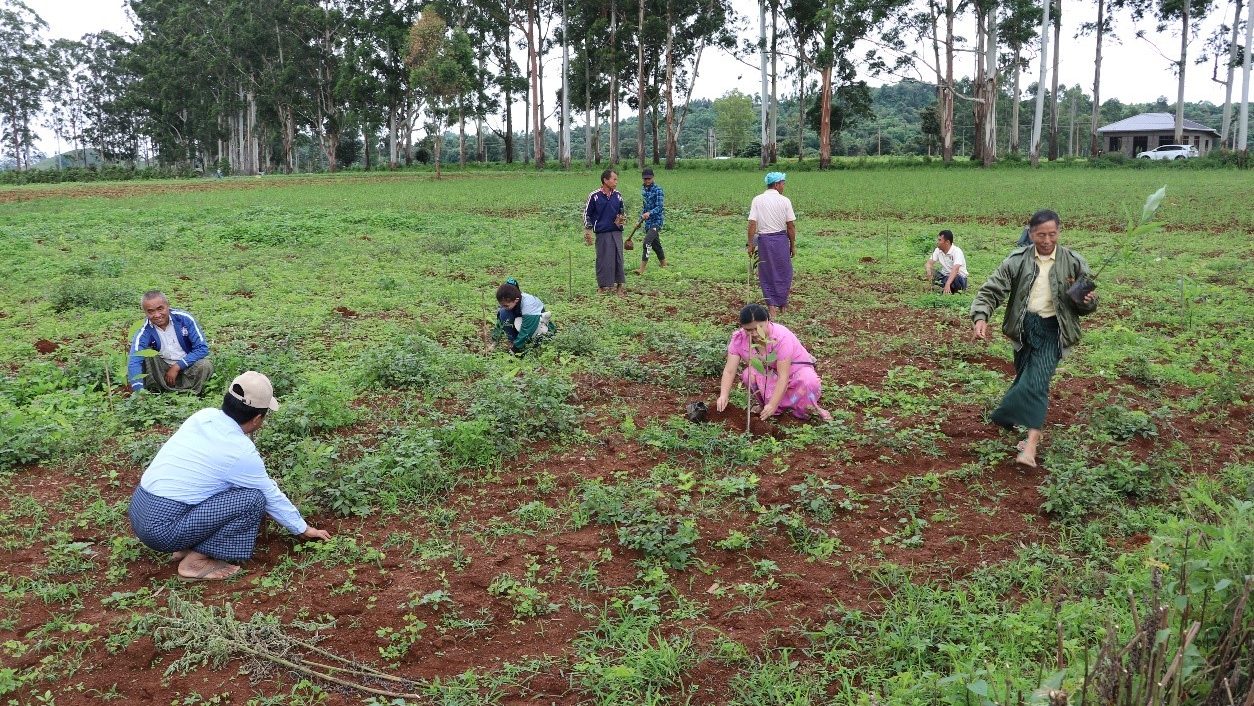This article briefly explains the project titled ‘Model Forest for Livelihood Improvement of Forest Dependent Communities through Development of Community-based Enterprise and Forest Conservation in Myanmar (AFoCO/015/2020)’ which will be implemented from 2020 to 2023.
Background
Deforestation and forest degradation is the most promising issue be faced by most developing countries. Myanmar was one of the top 7 deforested countries in the world according to FRA-20201. The area of forest cover had decreased from 57.9 % in 1990 to 42.19% in 2020 and with 0.96% of net annual change in forest cover from 2010 to 2020.
One of the primary causes for deforestation in Myanmar is illegal logging, which often involves the participation of poverty-stricken local people who have limited livelihood alternatives. Additionally, unstainable exploitation and over-extraction of forest resources by forest-dependent rural people might be another cause of forest damage. According to 2019 intercensal survey, more than 70% of the country’s population resides in rural areas, and their main livelihood source is from agriculture and forestry activities. The survey also revealed that about 40% and 26.6% of houses are made of wood and bamboo respectively, especially in rural areas. About 70% of rural households use fuelwood for cooking while only 24% use electricity2. Many studies in Myanmar have also revealed that the forest loss could be exacerbated by the extraction of timber for household materials, firewood, charcoal, and non-timber forest products (NTFPs) by local people, particularly in densely populated areas.
Realizing the problems of forest damage and loss of forest areas, it became apparent that the initiatives of creating livelihood opportunities combined with awareness-raising on forest conservation as well as reforestation and rehabilitation activities are necessary to improve local livelihoods and contribute to forest ecosystem restoration.
[1] Food and Agriculture Organization of the United Nations[FAO]. 2020. Global Forest Resources Assessment 2020. Main Report. FAO, Rome.
[2] Department of Population. 2020. The 2019 Inter-censal Synopsis Report. Ministry of Labour, Immigration and Population, The Republic of the Union of Myanmar.

Project Objectives
The “Model Forest for Livelihood Improvement of Forest Dependent Communities through Development of Community-based Enterprise and Forest Conservation in Myanmar” has been developed to tackle the problem of deforestation and forest degradation in Myanmar. The project is also in line with AFoCO’s strategic priority areas of ‘Initiating Customized Restoration and Reforestation model’, ‘Climate Change Adaptation’ and ‘Local livelihood Improvement and Community-based Enterprise Development’.
Incepted in 2020, the 3-year project aims to balance the forest conservation objectives with the livelihood improvement needs of the country. The project will apply an ideal approach of establishing model forest villages that can contribute to sustainable forest management and support local livelihood improvement through the development of community-based enterprises and forest conservation activities. Specifically, a model forest village participatory management plan will be developed based on baseline assessments on forest conditions, biodiversity, livelihood, and land-use changes. Community-based enterprises and/or community-based tourism based on the project sites’ context will be established in line with the model forest village plan.
During the project period, the livelihoods of local communities will be enhanced through agroforestry-based community forestry (using the ASEAN agroforestry guidelines adopted in 2019) and the building of home gardens in backyards. Additionally, the establishment of community-based enterprises and the broadening of market networks will be helpful in strengthening the business operation skills of local communities, eventually contributing to increased household income. Community-based tourism will be formulated as an alternative job option. Livelihood improvement training such as bamboo handicraft-making, as well as technical training and exchange visits will also be conducted to build the capacities of local people in the project sites.
The project is being implemented in three townships: Ywangan and Pindaya Township, Taungyi District, Southern Shan State and Paukkhaung Township, Pyay District, Shan State (South), Republic of the Union of Myanmar.

Expected Contributions
The pilot establishment of such model forest villages will highlight innovative and sustainable approaches that can achieve sustainable forest management while providing a wide range of benefits for local people.
This project’s contribution towards increasing green spaces through the establishment of home gardens and will also help enhance carbon sinks and support the livelihoods of local people. Community-based enterprises and community-based tourism development would also increase climate resilience and ensure sustainable livelihoods for participating communities.
Local communities’ knowledge of updated forestry techniques, forest management practices, and forest and land-use policies of the Forest Department will be improved, and the outcomes of this project will also address the rural development policy of Myanmar drafted in 2019.


Contributed by Kay Khine, AFoCO Fellowship Official from Myanmar

